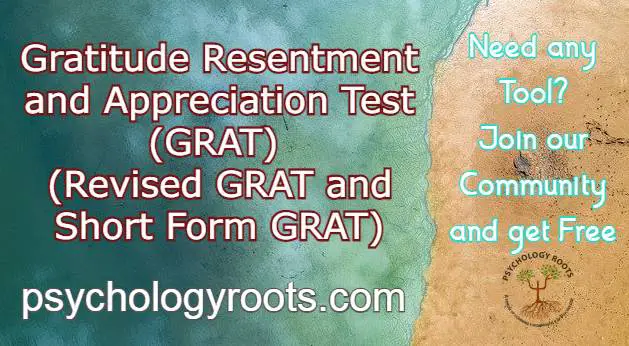Table of Contents
Gratitude Resentment and Appreciation Test (GRAT) (Revised GRAT and Short Form GRAT)
Here in this post, we are sharing the “Gratitude Resentment and Appreciation Test (GRAT) (Revised GRAT and Short Form GRAT)”. You can read psychometric and Author information. We have thousands of Scales and questionnaires in our collection (See Scales and Questionnaires). You can demand us any scale and questionnaires related to psychology through our community, and we will provide you with a short time. Keep visiting Psychology Roots.
About Gratitude Resentment and Appreciation Test (GRAT) (Revised GRAT and Short Form GRAT)
Gratitude Resentment and Appreciation Test (GRAT) (Revised GRAT and Short Form GRAT) is developed by Watkins, P. C., Woodward, K., Stone, T., & Kolts, R. L. The GRAT was designed to measure an individual’s dispositional gratitude.
The authors proposed several traits that that a grateful person would exhibit. A grateful person would not feel deprived in life, they would have a sense of abundance. They would acknowledge the contribution of others to their success and well-being, would appreciate life’s simple pleasures, and would acknowledge the importance of experiencing and expressing gratitude. Their conceptualization of gratitude was shown to correlate with measures of subjective well-being and positive affect.
The revised Gratitude Resentment and Appreciation Test (GRAT) consists of 44 items measuring these characteristics. The short-form GRAT consists of 16 items. Both scales are rated on a nine-point scale from I strongly disagree to I strongly agree with the statement. The revised GRAT has been shown to have good internal consistency, factorial validity, construct validity, and temporal stability (Watkins et al., 2003)

Gratitude Resentment and Appreciation Test (GRAT) (Revised GRAT and Short Form GRAT)
Avail Files: [sociallocker id=64051]
[/sociallocker]
Reference:
- Watkins, P. C., Woodward, K., Stone, T., & Kolts, R. L. (2003). Gratitude and happiness: Development of a measure of gratitude, and relationship with subjective well-being. Social Behavior & Personality: An International Journal, 31, 431-452.
Special Thanks
We are especially thankful to Rida Haider, Who prepare this information and share it with us. All credit goes to Rida.
Information:
The purpose of our website is only to help students to assist them in finding the best suitable instrument for their research especially in Pakistan where students waste a lot of time in search of the instruments. It is totally free of cost and only for creating awareness and assisting students and researchers for good researches. Moreover, it is necessary for you to take the permission of scales from their representative authors before use because copyrights are reserved by the respected authors.
Help Us Improve This Article
Did you find an inaccuracy? We work hard to provide accurate and scientifically reliable information. If you have found an error of any kind, please let us know.
Add comment. we appropriate your effort.
If you have any scale or any material related to psychology kindly share it with us at psychologyroots@gmail.com. We help others on behalf of you.
Follow